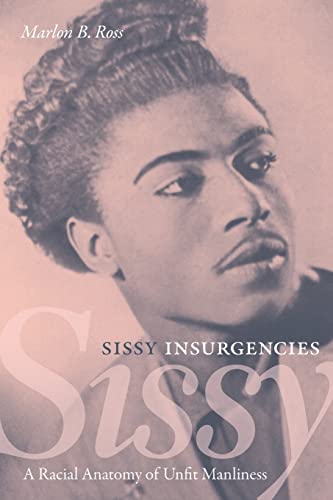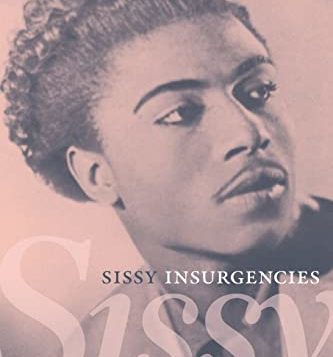 SISSY INSURGENCIES
SISSY INSURGENCIES
A Racial Anatomy of Unfit Manliness
by Marlon B. Ross
Duke Univ. Press. 256 pages, $31.95
“ONCE WE BEGIN to look for them, we see sissies everywhere,” writes Marlon B. Ross in Sissy Insurgencies, noting that this controversial label can apply not only to such obviously gender non-conforming men as author James Baldwin and singers Little Richard and Sylvester James, but also to figures like educator Booker T. Washington, historian Henry Louis Gates, and basketball star Wilt Chamberlain. Ross is careful to make it clear that “sissy” does not equal “gay” but rather men who present nontraditional expressions of masculinity. Looking at a range of African-American autobiographies and autobiographical fiction as well as works by out sports figures, Sissy Insurgencies finds the sissy and the fear of being one to be a shadow presence behind much of what passes for “straight-acting” manhood.
Ross, a professor of English at the University of Virginia, begins this closely reasoned study with Booker T. Washington and his near obsession with cleanliness, developed during his youth as a house slave. Moreover, Washington’s accommodationist political stance—the idea that African Americans should focus more on blue collar trades and self-help rather than agitating for equal rights, as well as what Ross calls his “sycophantic” relationship with powerful white men—was also considered “unmanly” by many of his critics. Sissy Insurgencies contrasts Washington with his Tuskegee Institute colleague, the confirmed bachelor scientist George Washington Carver, whose “physiological” sissiness was signaled by his high-pitched voice, love of painting and crocheting, and “horseplay” with a coterie of male student followers—traits that were all cause for speculation around campus.
In contrast to Washington, writer and naacp head James Weldon Johnson offers an example of what Ross calls “gentle manliness” in telling his own story in Along This Way (1933). In his fictional Autobiography of an Ex-Colored Man, written at the height of the Jim Crow era, Johnson writes: “For though the black man fights passively, he nonetheless fights; and his passive resistance is more effective at present than active resistance could possibly be. He bears the fury of the storm as does the willow tree.” Black male autobiographers of the 1980’s such as scholars Henry Louis Gates and Michael Awkward provide an alternative to the “hard” Black male valorized by the rise of hip-hop and rap, presenting themselves as “mama’s boys” who were bad at sports in their early years but no less heterosexual (or “straight acting’) for all that. Ross considers this “sissy flirtation” a response to critiques of the heterosexist, homophobic, and sissy-phobic stance of some Black leaders in the late 20th century. David Kopay, Billy Bean, and other gay men in their “sports disclosure memoirs,” as Ross calls them, “tend to fashion homosexuality as a fixed identity deserving of social inclusion while rendering sissiness as a suspect practice to be policed as a social threat. … The gay man is born that way, but the effeminate man is not.” Such “sissy avoidance” stops even basketball great Wilt Chamberlain from using the underhanded free-throw or “granny shot” despite his success with it. Autobiographies by sportsmen like baseball player Glen Burke and footballers Esera Tuaolo and Roy Simmons show how they navigated being gay within communities of color and the role that race plays in the construction of sports masculinity. Although heterosexual, the flamboyant basketball player Dennis Rodman is considered a “sartorial queer” by Ross, who praises his gay-affirmative autobiography. The “heroic” James Baldwin is at the center of Sissy Insurgencies both literally and figuratively. Closely reading Baldwin’s first and last novels, Go Tell It on the Mountain and Just Above My Head, along with his his essays, Ross illuminates the ways in which Baldwin “fashions a very public sissy demeanor not only through his writing but also through his entanglements with four quite different mass movements implicated in the stigma of the sissy: Black Pentecostalism; the Red Scare and its attendant panic over ‘soft’ manliness; the nonviolent civil rights movement’s demand for muscular leadership; and black nationalism’s scapegoating of the homo-sissy.” Linking Baldwin to singers Little Richard and Sylvester, Ross posits what they have in common: “the black cultural experience of being church sissies, and then transfiguring that churchified way of being circumspect, and the expressive talents it cultivates, into cultural capital as homo-sissies on the world stage.” Including considerations of and references to works by Richard Wright, Langston Hughes, and Amiri Baraka, among others, Sissy Insurgencies is as much a provocative literary study of African-American fiction and autobiography as it is an examination of the role of the sissy in Black and mainstream American culture.
Reginald Harris, a writer and poet based in Brooklyn, is the author of Ten Tongues (2003) and Autogeography (2013).





